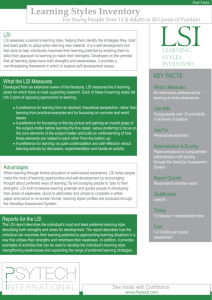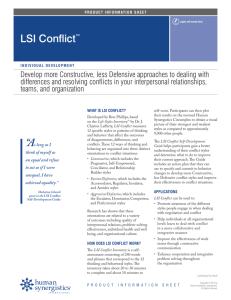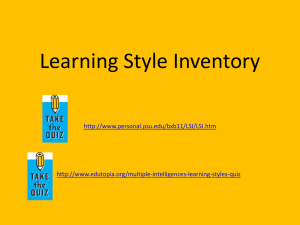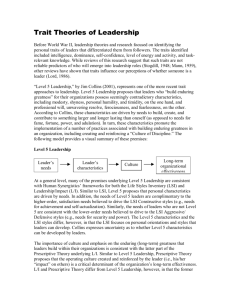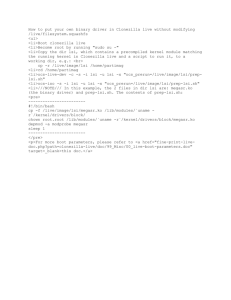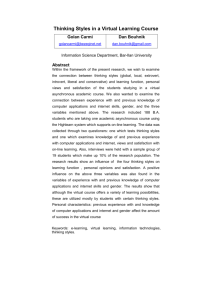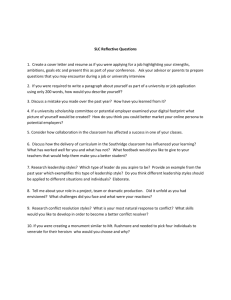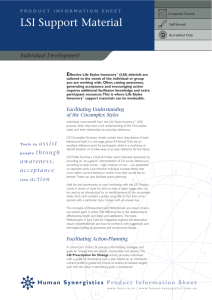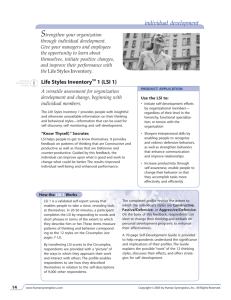LSI Leadership Development Workshop The Mind Set Advantage
advertisement
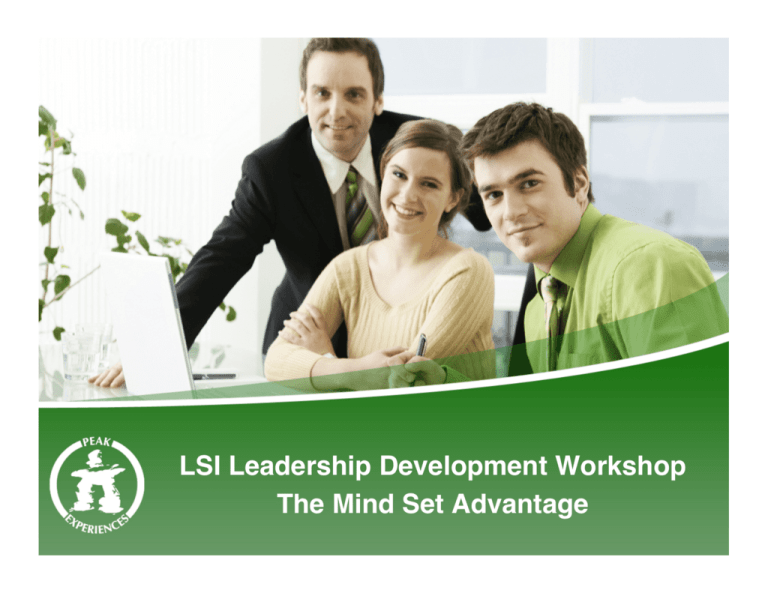
LSI Leadership Development Workshop ! The Mind Set Advantage! The LSI represents a series of strategies chosen (by the child) to manage one through life. These behaviors and attitudes typically assemble before the age of five and are elaborated upon in an astonishing range of strategic variables with a common motive of personal satisfaction or selfprotection. Our Primary Influence During ones upbringing, the primary influence in most of our lives is the role of the parent / child relationship often responsible for forming our predominate forms of thinking. The LSI leadership assessment measures the basis of our thinking styles, represented in 12 forms of human motivation that create the underpinnings and health of our attitudes, values and belief systems. Trust and Personal Experience Constructive Thinking Styles Passive / Aggressive Thinking Styles Invisible to You, Transparent to Others These areas affect our choices and may dominate a persons’ life. Most individuals live their passive or aggressive behavior in an unconscious manner until interactions with others brings it into the conscious mind. (awareness) This unconsciousness allow us to live our lives feeling like we are healthy, ok and effective. Emotional Triggers Current stimulus in our adult world may remotely trigger events from the past. If this stimulus feels “emotionally” the same, it most often stimulates a common responses. 1. Constructive 2. Passive/Defensive, or 3. Aggressive/Defensive Humans Desire Growth The Importance of the Examination of Self Examination of Self at the Middle Passage Re-visit and Revision our Sense of Selves. How We Often See The World Potential Growth? The initial experiences in the world can negatively affect our sense of self. We create ways to defend ourselves from further hurt. The potential for growth declines. Opening ones self to pain, which is where growth reigns can be too frightening. Most of us stay stuck between the intrinsic nature of the child and the world where we were socialized. Lenses into the World In growing up we are handed a multitude of lenses – genetic inheritance, gender, specific cultures, and the variables of our family environment. All of which constitutes our sense of reality. LSI as a Lense into Self Looking back begs a question, have we been living less from our true nature or simply thru the reality gained by the lense (LSI) in which have become us. Genetics plays a small role, the largest being families as they transmit their vision of the world / life from generation to generation, the lense passes from parent to child. And out of all that refracted perspectives, choices and consequences. Courage to Live the Integrity of Ones Values “The Mindset Advantage” Our thoughts characterize who we are and shape our lives. How we think determines how we perceive reality and relate to others, as well as how we solve problems and make decisions. Thus, how we live our lives is directly related to the quality of our thoughts. “The Mindset Advantage” In order to understand our thinking patterns “styles”, grow, leverage key strengths and change behaviour, we must first examine the feelings and thoughts that underlie and motivate human behaviour. This is the Mind Set Advantage™ that we utilize to support enhancing our clients individual and organizational effectiveness. What is Leadership? What is "Leadership"? People are not leaders! (unless they somehow transform, shape, or influence others.) Scientific Management circa 1900 • F.W. Taylor • Watched how people worked based on job analysis and job satisfaction • Time and motion studies • Used to develop the Ford assembly line • Treated people as one part of the production component • Productivity increased 40% Hawthorne Studies circa 1928 Hawthorne Studies: What effect did they have on productivity? Hawthorne Studies: What effect did they have on productivity? Hawthorne Studies: Conclusion? Although the hygiene factors were nice, what really caused sustained productivity improvement was: • the personal attention • the feeling that their efforts were recognized • their efforts counted • their opinions were important Douglas MacGregor Blake and Mouton Concern for People • Relationship Focused • Take care of the people and they will get the job done Hierarchy of Human Needs Needs for Self Actualization. Human Fullness/Potential Needs for Achievement Basic Needs for Personal Worth Basic Drive for Fulfilling Social Needs. Acceptance Basic Drive for Physical and Psychological Security Basic Biological Needs for Air, Water, Food, Shelter Frederick Herzberg Security Needs Satisfaction Needs • People who take jobs and enter relationships for security • Maintain the status quo • Resist Change • Need others • People who look for jobs and relationships that are personally satisfying • Like to grow • Enjoy challenges • Like people and themselves “Know Thyself.” These words, attributed to Socrates, were inscribed on the Temple of Delphi over 2000 years ago. The idea that we should learn all we can about ourselves has stood the test of time; our quest toward self-discovery continues today… LSI Leadership Effectiveness Tool Combines: Productivity/ People Orientation with Motivation PURPOSE AND RATIONALE TO LEARN ABOUT YOURSELF AND WHAT MAKES YOU ACT THE WAY YOU DO. BY KNOWING AND UNDERSTANDING THE WAY YOU THINK, YOU CAN CHANGE YOUR BEHAVIOUR TO INCREASE YOUR EFFECTIVENESS IN ALL AREAS OF LIFE. WHAT IS THE LSI SELF-DEVELOPMENT TOOL – INCREASES SELF-AWARENESS POSITIVE CHANGE MOTIVATOR – ENCOURAGES PEOPLE IN THEIR EFFORTS TO IMPROVE THEMSELVES LSI IMPACTS THINKING STYLES INFLUENCE OUR GOALS, RELATIONSHIPS, AND HOW WE HANDLE STRESS. JOB PERFORMANCE AND LEADERSHIP EFFECTIVENESS ARE DEPENDENT ON THE WAY WE THINK ABOUT OTHERS AND OURSELVES. THE LSI LOOKS AT IDENTIFIES THE WAY YOU ARE APPROACHING AND HANDLING WHAT IS GOING ON IN YOUR LIFE TODAY IN SPECIFIC; – THINKING PATTERNS – SELF CONCEPT – BEHAVIOUR ‘S + T = R’ PROCESS Stimulus + Thought = • Event Conscious • Circumstance Unconscious • Situation Response Appropriate Inappropriate How we think about/interpret situations influences our reactions/response. Comparison (Percentiles) Explanation HIGH / MODERATE / LOW An Effective Leader LSI An Effective Leader LSI YOU ARE A HEALTHY PERSON AND A SOURCE OF LEADERSHIP Your leadership profile suggests a combination of strengths, namely goal accomplishment, a strong sense of personal direction and the capability to derive enjoyment and satisfaction from what you do. These strengths are most frequently recognized by experienced managers, consultants and psychologists as key factors in personal and organization effectiveness. You have proficient interpersonal skills and the ability to accomplish tasks efficiently. It’s likely that you derive personal satisfaction from your maximum commitment to both the job at hand and the individuals involved. An Effective Leader LSI In general, others would describe you as: - Enthusiastic; - Possessing unlimited energy in your quest to accomplish your own goals; - An achiever — you strive to maintain a standard of excellence that is higher than that expected by immediate superiors; - Willing to give and receive honest feedback; - Routinely seeking advice and counsel to enhance and broaden your perspective; - Able to clearly delineate the limits of your own skills; - Deriving strong satisfaction from accomplishing self-set goals; - Believing in cause-and-effect relationships, as opposed to fate, luck or chance; - Having a deep concern for and commitment to others; - Able to inspire and motivate others; and - Having a strong, well-developed sense of what’s possible with regard to people and tasks. Three Core Thinking Styles Passive/Defensive Styles PASSIVE-DEFENSIVE TENDENCY TO LET THE GROUP DOMINATE SELF MEDIOCRE SOLUTIONS NO CONSTRUCTIVE DEBATE NO CREATIVITY FEELING OF CONSTRAINT PASSIVE-DEFENSIVE LOW SATISFACTION SELF PROTECTING PLACES EMPHASIS ON SELF TO SATISFY SECURITY NEEDS IN INTERPERSONAL RELATIONSHIPS Aggressive/Defensive Styles AGGRESSIVE-DEFENSIVE INDIVIDUALS ARE ABOVE THE GROUP USE THE GROUP TO ACHIEVE THEIR OWN OBJECTIVES TO WIN MEDIOCRE SOLUTIONS LIMITED BUY-IN TO THE GROUP AND TO SOLUTIONS AGGRESSIVE-DEFENSIVE VERY TENSE PROCESS EMPHASIS ON SELF TO MAINTAIN STATUS AND POSITION SATISFY SECURITY NEEDS THROUGH TASK ACCOMPLISHMENT Constructive Styles CONSTRUCTIVE CONSENSUS DECISION MAKING HIGHER QUALITY DECISIONS HIGHER LEVEL OF PARTICIPANTS’ SATISFACTION GROUP PROCESS = HIGHER LEVEL OF EFFECTIVENESS CONSTRUCTIVE ENCOURAGE AND PROMOTE PERSONAL DEVELOPMENT SATISFACTION FROM: - HARMONIOUS PEOPLE AND RELATIONSHIPS - TASK EFFECTIVENESS HOW DO WE REACT HOW DO WE REACT HOW DO WE REACT HOW DO WE REACT HOW DO WE REACT 1st Stage - SHOCK - “This is an error! Or This is awesome!” 2nd Stage - DENIAL - “It can’t happen to me!” 3rd Stage - ANGER, DEPRESSION, EUPHORIA 4th Stage - ACCEPTANCE - “O.K. so now what?” 5th Stage – ACTION HOW DO WE REACT 1st Stage - SHOCK - “This is an error! Or This is awesome!” 2nd Stage - DENIAL - “It can’t happen to me!” 3rd Stage - ANGER, DEPRESSION, EUPHORIA 4th Stage - ACCEPTANCE - “O.K. so now what?” 5th Stage – ACTION 6th Stage – ENDURANCE & SUPPORT PASSIVE DEFENSIVE STYLES APPROVAL (3:00) APPROVAL (3:00) CENTERED ON THE PERSON, TOO MUCH ACCEPTANCE AND BELONGING NEEDED PLEASANT AND COMFORTING INTERPERSONAL RELATIONSHIPS TASK IS NEGLECTED CLIMATE WITHOUT CONFLICT LOW SELF-ESTEEM OR CONFIDENCE APPROVAL (3:00) AN OVER-CONCERN WITH BEING “POPULAR” AND WELL LIKED A TENDENCY TO BE TOO AGREEABLE “WISHY-WASHY” DIFFICULTIES WITH CONFLICT, NEGOTIATION AND CONFRONTATION PREOCCUPATION WITH OPINIONS OF OTHERS CONVENTIONAL (4:00) CONVENTIONAL (4:00) PREDICTABLE, QUICK TO CONFORM PRESSURE TO FIT WITHIN GROUP AND TO CONFORM HOMOGENEOUS IDEAS FOLLOWS RULES TO MAINTAIN SECURITY UNQUESTIONED OBEDIENCE TO AUTHORITY FIGURES AND RULES CONVENTIONAL (4:00) A PREFERENCE FOR STAYING UNSEEN AND UNNOTICED A TENDENCY TO COVER UP MISTAKES REDUCED INITIATIVE A PREOCCUPATION WITH APPEARING AVERAGE, “NORMAL” REDUCED ORIGINALITY DEPENDANT (5:00) DEPENDANT (5:00) DIFFICULT TO GET GOING UNCERTAIN ABOUT HOW TO PROCEED TO SOLVE PROBLEMS IN AN ACCEPTABLE FASHION OBJECTIVES ARE DETERMINED BY OTHERS WAITING TO OBEY ORDERS FEELINGS OF ANXIETY DEPENDANT (5:00) A PASSIVE ATTITUDE FEELINGS OF HELPLESSNESS A TENDENCY TO BE EASILY INFLUENCED A LACK OF SELF RESPECT, WHICH RESULTS IN FEELING UNABLE TO ACCOMPLISH THINGS DIFFICULTY MAKING DECISIONS AVOIDANCE (6:00) AVOIDANCE (6:00) NOT A REAL GROUP NO MOTIVATION TO WORK TOGETHER GROUP CANNOT SATISFY INDIVIDUAL NEEDS MINIMUM AND QUIET COMMUNICATION AVOIDANCE (6:00) A STRONG TENDENCY TO DENY RESPONSIBILITY FOR ONE’S OWN BEHAVIOUR FEELINGS OF GUILT OVER REAL OR IMAGINED MISTAKES FEAR OF FAILURE LACK OF SELF-DISCLOSURE THAT EVENTUALLY LEADS TO EMOTIONAL ISOLATION AGGRESSIVE DEFENSIVE STYLES OPPOSITIONAL (7:00) OPPOSITIONAL (7:00) VERY CRITICAL OF IDEAS AND SUGGESTIONS FOCUS ON FAULTS OPPOSE THEIR ARGUMENTS ON ALL POINTS CHALLENGE AND QUESTION EVERYTHING THAT IS PROPOSED OPPOSITIONAL (7:00) THE ABILITY TO ASK TOUGH, PROBING QUESTIONS SEEM ALOOF AND DETACHED FROM PEOPLE A SARCASTIC SENSE OF HUMOR NEGATIVE CYNICAL ATTITUDE POWER (8:00) POWER (8:00) EMPHASIZE THEIR STATUS AND INFLUENCE AGGRESSIVE, DESIRE TO BE ON TOP POWER STRUGGLES MINIMAL RISKS AND IGNORE OTHERS’ POINTS OF VIEW POWER (8:00) A HIGH NEED FOR POWER, STATUS, INFLUENCE, AND CONTROL A TENDENCY TO DICTATE, RATHER THAN GUIDE THE ACTIONS OF OTHERS. AN AGGRESSIVE AND POSSIBLY VENGEFUL ATTITUDE NARROW RIGID THINKING COMPETITIVE (9:00) COMPETITIVE (9:00) COMPETE WITH EACH OTHER SHOW THAT THEY ARE SUPERIOR NEED TO WIN TO MAKE A GOOD IMPRESSION NO COLLABORATION GLADIATORS IN AN ARENA COMPETITIVE (9:00) THE ASSOCIATION OF SELF WORTH WITH WINNING AND LOSING A NEED FOR RECOGNITION AND PRAISE FROM OTHERS TENDS TO BE AGGRESSIVE A “WIN-LOSE” ORIENTATION THAT DISTORTS PERSPECTIVE AND GOALS AN EXTREME FEAR OF FAILURE PERFECTIONISTIC (10:00) PERFECTIONISTIC (10:00) ASSUMPTION THAT PERFECTION = EXCELLENCE AVOIDS MISTAKES SINK IN DETAILS FEELINGS OF FRUSTRATION AND STRESS INVEST TOO MUCH TIME PERFECTIONISTIC (10:00) A TENDENCY TO ATTACH SELF WORTH TO TASK ACCOMPLISHMENT REPETITIVE, SOMETIMES RITUALISTIC BEHAVIOUR PLACE EXCESSIVE DEMANDS ON SELF AND OTHERS A PREOCCUPATION WITH DETAIL THAT DISTORTS PERSPECTIVE AND JUDGMENT INABILITY TO DEAL WITH EMOTION CONSTRUCTIVE STYLES ACHIEVEMENT (11:00) ACHIEVEMENT (11:00) GROUP IS AN EXTENSION OF INDIVIDUAL MEMBERS ARE MOTIVATED TO USE AVAILABLE RESOURCES SYSTEMATIC AND RATIONAL OPEN DISCUSSIONS OF CONSTRAINTS AND RISKS HIGH LEVEL SOLUTIONS BELIEVES IN THE BENEFITS OF ASKING FOR AND GIVING HONEST FEEDBACK ACHIEVEMENT (11:00) A FOCUS ON ACHIEVING A STANDARD OF EXCELLENCE LACK OF BELIEF IN FATE BELIEF THAT INDIVIDUAL EFFORT COUNTS COMMITTED TO MAKING THINGS BETTER A PREFERENCE FOR SETTING AND ACCOMPLISHING REALISTIC, ATTAINABLE GOALS SELF-ACTUALIZING (12:00) SELF-ACTUALIZING (12:00) CONCERN FOR SELF DEVELOPMENT STRONG INSTINCTS AND INTUITION RELATIVE FREEDOM FROM FEELINGS OF GUILT OR WORRY AN ENERGETIC, EXCITING APPROACH TO LIFE A STRONG DESIRE TO KNOW ABOUT AND EXPERIENCE THINGS DIRECTLY SHOW SIGNS OF HIGH MATURITY HUMANISTIC ENCOURAGING (1:00) HUMANISTIC ENCOURAGING (1:00) INTERACTIONS ARE PEOPLE ORIENTED SATISFACTION FROM HELPING THE LEARNING PROCESS EXPRESS INDIVIDUAL OPINIONS AND TAKE THE TIME TO DISCUSS OTHERS’ IDEAS HUMANISTIC ENCOURAGING (1:00) A FOCUSED CONCERN OF THE GROWTH AND DEVELOPMENT OF PEOPLE APPRECIATION OF THE STRENGTHS IN OTHERS, AND BELIEF IN THEIR POTENTIAL IMPROVEMENT OPTIMISM IN REGARDS TO WHAT PEOPLE CAN ACCOMPLISH HUMANISTIC ENCOURAGING (1:00) A NURTURING APPROACH TO RELATIONSHIPS THE WILLINGNESS TO ASSIST OTHERS WITH SELF-IMPROVEMENT THE ABILITY TO INSPIRE AND MOTIVATE OTHERS WHAT PEOPLE CAN ACCOMPLISH AFFILIATION (2:00) AFFILIATION (2:00) NEED TO RELATE TO PEOPLE DRAW SATISFACTION FROM RELATIONSHIPS AMICABLE AND PLEASANT INTERPERSONAL RELATIONSHIPS TEAM SPIRIT AND COOPERATION AFFILIATION (2:00) A NEED TO BUILD RELATIONSHIPS THAT ARE MEANINGFUL AND RECIPROCAL STRONG WELL-DEVELOPED INTERPERSONAL SKILLS A TENDENCY TO MOTIVATE OTHERS USING GENUINE PRAISE AND FRIENDLINESS Outcomes Associated with LSI-STYLUS Constructive Passive/ Aggressive/ Defensive Defensive Salary 0 -- + Organizational Level + -- + Managerial Effectiveness ++ 0 0 Interest in Self-Improvement ++ + -- Quality of Interpersonal Relations + ++ -- Psychological/Physiological Health ++ - -- Problem-Solving Effectiveness + - - Sample Profiles Key-Level Managers Managers by Effectiveness Managers by Level Health Problems Schools Hospitals Occupation Teams Organizations Key-Level Teachers Principals who failed in their Jobs Effective Teachers in Relationship to Students and Meeting Outcomes Successful Principals Leadership Profiles (As Rated by Others) Top 10% Most Effective Bottom 10% Least Effective Health Problems Depression Heart Disease N=138 Ulcers N=224 High Blood Pressure Schools Teachers Student Leaders General Students The Process of Self-Improvement Commitment to a plan of action Deciding to improve yourself Knowledge of how your thinking and behaviour affects you and others Acceptance of yourself as you are now Awareness of your strengths and weaknesses Change Guidelines Acknowledge and accept all aspects of yourself Recognize that your sense of self-worth is not connected to your LSI scores Specifically define what you want to change and why Increase your confidence by concentrating on what you do well Practice using more effective behaviour in your mind Discipline yourself to monitor your thoughts and test your assumptions Lasting change takes time Your Self-Improvement Plan ® LSI Stylus Report ® LSI Self-Development Guide ® LSI Prescription for Change ® Action Planning – LSI Stylus Action Planning ® LSI Self-Development Guide Identify your Primary and Backup Styles Choose a style to work on Identify influences that may be associated with this style Consider the consequences of this style Consider how your life would be different if you changed this style Identify alternative thoughts and behaviours How would you like things to be different Identify barriers to making this change Identify ways to overcome these barriers What will you gain by making this change Identify Action Steps, support person and start time Action Planning ® LSI Prescription for Change Complete the insight and change commitment lists Complete the “to be more effective …” inventory Separate NCR paper Transfer your LSI scores by style Identify your lowest Constructive score and your highest two counter-productive scores Working across the three rows, select those items with a “2” or “3” Identify the negative consequences of these three thinking styles and how would your life/job be better if you changed these thinking styles Identify any barriers to change and how you will overcome them Identify Action Plan, support person and timing EFFECTIVE CHANGE C=A*B*D>X Where: C = the probability of change being successful A = dissatisfaction with the status quo or current state B = a clear statement of the desired outcome after the change (future state) D = concrete first steps towards the goal X = cost of change EFFECTIVE CHANGE EFFECTIVE CHANGE Change agents play a particularly important role in helping people to experience and resolve internal tension, weigh the benefits and downsides of change, and build self-confidence in the ability to make the shift towards clear goals/vision. How you think and talk about change is a critical indicator of success. The change agent must help individuals resolve conflict and/or tensions between their current state and the desired goals and values. For More Information: Peak Experiences 1959 Upper Water Street, Suite 1700 (Purdy’s Tower One) Halifax, Nova Scotia B3J 3N2 902.482.4506
